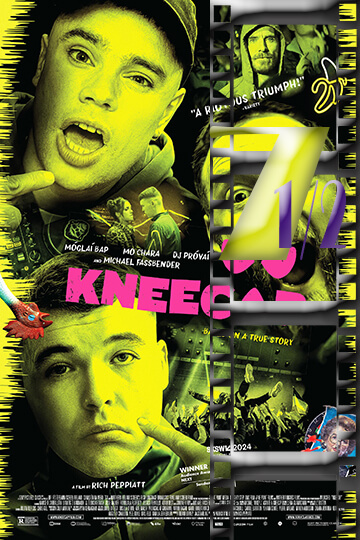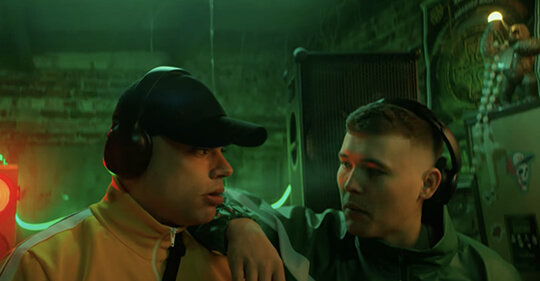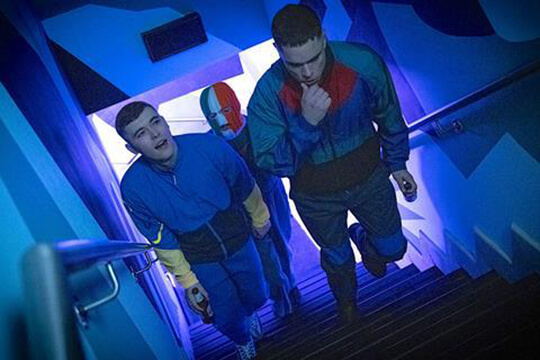



What’s It About
Kneecap is set in West Belfast in 2019. Fate brings together disillusioned music teacher JJ with self-confessed ‘low life scum’ Naoise and Liam Og, changing the sound of Irish music forever,” the description continues. “Under the name Kneecap, their band begins molding the language to fit their tough, anarchic, hedonistic lives. A language encumbered with forty words for stone now has one for stoned. But to get their voices heard, the trio must overcome police, paramilitaries, and politicians as the future of the Irish language erupts into the public arena – with them at the center. Yet their worst enemies are often themselves, as family and relationship pressures threaten their dreams, and their illegal exploits draw condemnation from all sides. The film stars the band members as themselves and Michael Fassbender.



MOVIESinMO REVIEW
“Kneecap” (2024) is a film where the Irish rap group Kneecap members credibly portray versions of themselves. This isn’t one of those movies where non-professional actors struggle to keep pace with their seasoned counterparts. Instead, the performances are seamless, realistic, and sometimes uncomfortable, yet impossible to avoid. The movie revolves around a group that rapped in Irish, also known as Gaelic, in West Belfast after the “Troubles” in Northern Ireland. To simplify, the “Troubles” spanned decades and involved conflict between the Catholic Irish majority, who wanted Northern Ireland to unite with the Republic of Ireland, and the Protestant minority, who preferred Northern Ireland to remain part of the United Kingdom. In the film, the rap group plays themselves, with the story set in 2019. Childhood friends Liam and Naoise are fond of getting high, and one night, they find themselves separated during a police chase. Liam, refusing to speak English, demands an interpreter at the station. JJ, a Gaelic high school teacher, reluctantly agrees to translate but sympathizes with Liam after reading his notebook filled with lyrics in Gaelic. This encounter leads the trio to form Kneecap. This rap group quickly rises to fame, each member facing distinct challenges. Liam, the film’s narrator, delivers a solid performance aided by his undeniable screen presence. His charismatic looks shine through, even if his hairstyle and wardrobe choices are questionable. He gets the romantic subplot, falling for a woman on the opposite side of the political divide. On the other hand, Naoise is arguably the weakest actor of the trio. Director Rich Peppiatt, who has previously filmed Kneecap’s music videos but doesn’t speak Gaelic, smartly keeps Naoise’s dialogue minimal, often having him stand around looking bewildered. This approach mitigates the risk of him becoming the movie’s weak link, especially given that his storyline is crucial to the plot. The film’s narrative largely hinges on Naoise’s family drama. His father, Arlo, portrayed by Michael Fassbender, is a fugitive wanted by the police for allegedly making bombs during the Troubles. Arlo is a mythical figure, embodying the spiritual resistance and Gaelic pride Liam and Naoise channel into their drug-fueled rap career. However, Arlo is also the looming judge, jury, and executioner who will decide if their interpretation of his teachings is a betrayal worthy of his wrath. The tension escalates as the self-appointed Radical Republicans Against Drugs target Liam and Naoise, condemning them as disgraceful to the cause for being hard-partying drug dealers. Meanwhile, the police view the duo as low-life criminals, future terrorist sympathizers hiding a fugitive, rather than focusing on their actual illegal activities. Liam and Naoise’s lives become a new battleground, not on the streets, but within the post-Troubles landscape. JJ, the standout actor of the three, is the only older character who sees value in Liam and Naoise. He’s grappling with a midlife crisis, disillusioned by his unfulfilling job teaching disinterested high school students. In contrast, Liam and Naoise’s energetic use of Gaelic makes the language feel alive, not just a dead academic exercise. Adding to JJ’s frustration is his wife’s successful career, which is rooted in her passionate commitment to Gaelic. At the same time, he feels no such satisfaction in his work. JJ’s storyline drives much of the film’s tension, as his journey becomes a question of whether he will implode or reinvent himself meaningfully. The film subtly addresses his midlife crisis and underlying resentment toward his wife’s achievements, portraying him as a sympathetic and relatable character despite his flaws. His late-life dive into the unexpected world of rap is chaotic and rejuvenating, channeling his inner turmoil into a creative force that ultimately elevates Liam and Naoise’s raw talent. His vision reveals a place for them where they don’t quite fit. “Kneecap” features surrealistic imagery intended to reflect the drug-induced perspectives of its protagonists. The film is saturated with scenes involving drug use to the point where it occasionally feels overdone. The constant drug references and jokes risk overshadowing the more intriguing aspects of the characters and their story. For viewers unfamiliar with Kneecap, it’s hard to distinguish between the film’s fictional elements and reality. This blurring of fact and fiction can leave one wondering whether the movie is an infomercial or an authentic portrayal. It’s like watching “Straight Outta Compton” with the understanding that Dr. Dre and Ice Cube didn’t reveal all their darker deeds—they controlled the script. Similarly, “Kneecap” seems to whitewash certain aspects, suggesting that the group was less naïve about the mainstream Irish language than they claim. Additionally, while the film portrays Naoise’s mother, Dolores, as having a happier ending, it’s hinted that her sorrow may have had other causes unrelated to Arlo’s revolutionary activities. “Kneecap” is bold and unapologetic in its depiction of the sex, drugs, and hip-hop lifestyle. The subplot involving Liam and Naoise clashing with the Radical Republicans Against Drugs is mainly played for laughs and shouldn’t be taken too seriously. However, some viewers might find the film’s portrayal of hedonism offensive, as it seems to glamorize a reckless lifestyle. It’s likely that the movie downplays or omits some of the more unsavory details of Kneecap’s real-life exploits. The film’s blend of slapstick comedy and serious political commentary doesn’t always mesh smoothly. Still, the strong performances from the main cast help maintain its often chaotic tone. Fassbender, known more for his dramatic roles, appears to enjoy himself as the deadbeat dad who believes his actions were for a noble cause. While “Kneecap” might resonate most with those familiar with Northern Irish culture, it also appeals to fans of raunchy comedies about underdogs overcoming an oppressive system. Stripped of its historical context, the film still tells the timeless story of an unlikely group rising from obscurity to fame. The film will likely be a hit for those with a vested interest in the group. As the credits roll, viewers are treated to real-life footage from 2022, closing with a photo from the opening scene. Ultimately, “Kneecap” is about an improbable group of people finding fame. For those who love music, it’s a film worth watching.
OUR RATING – A BELFAST 7.5

